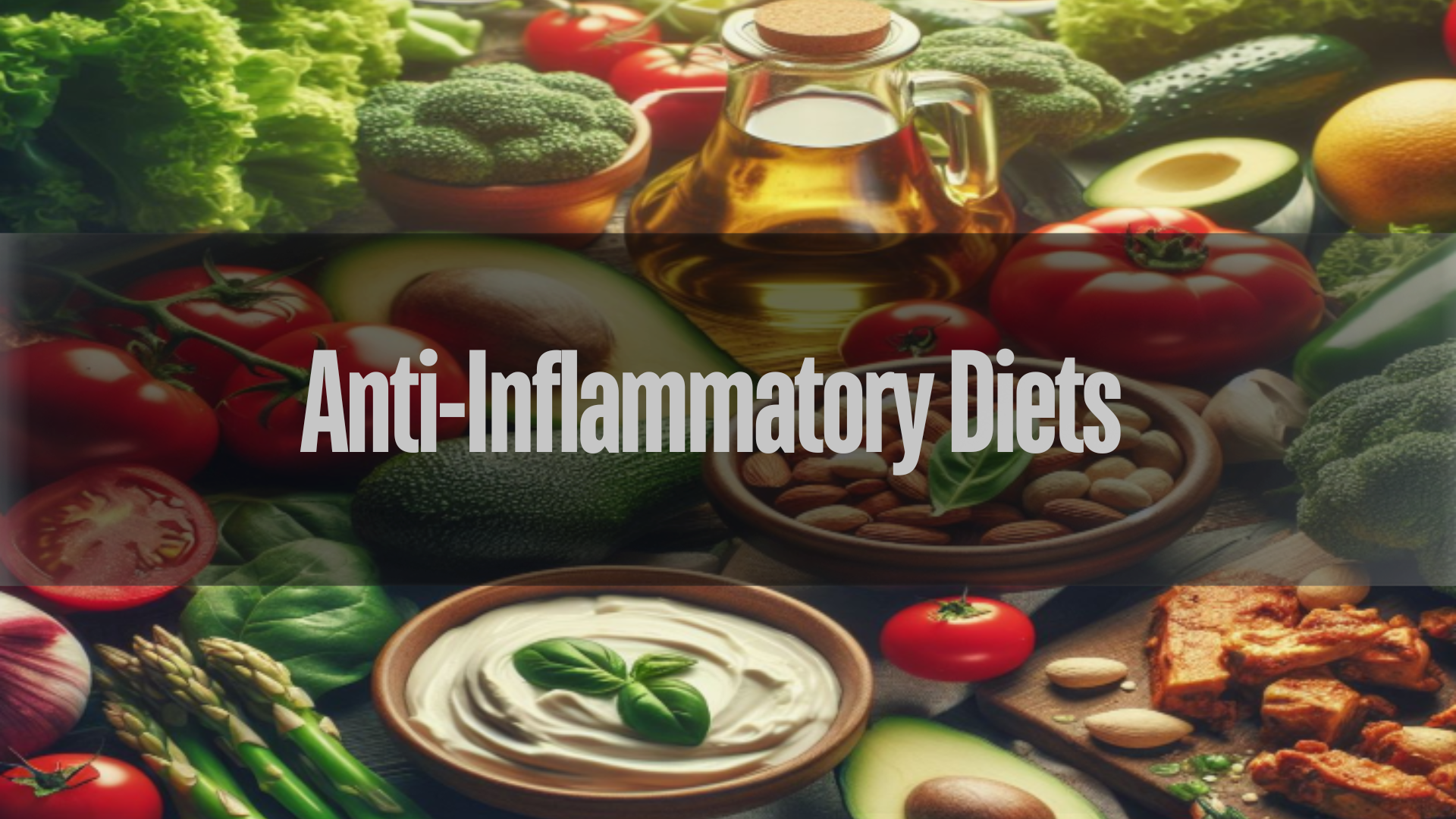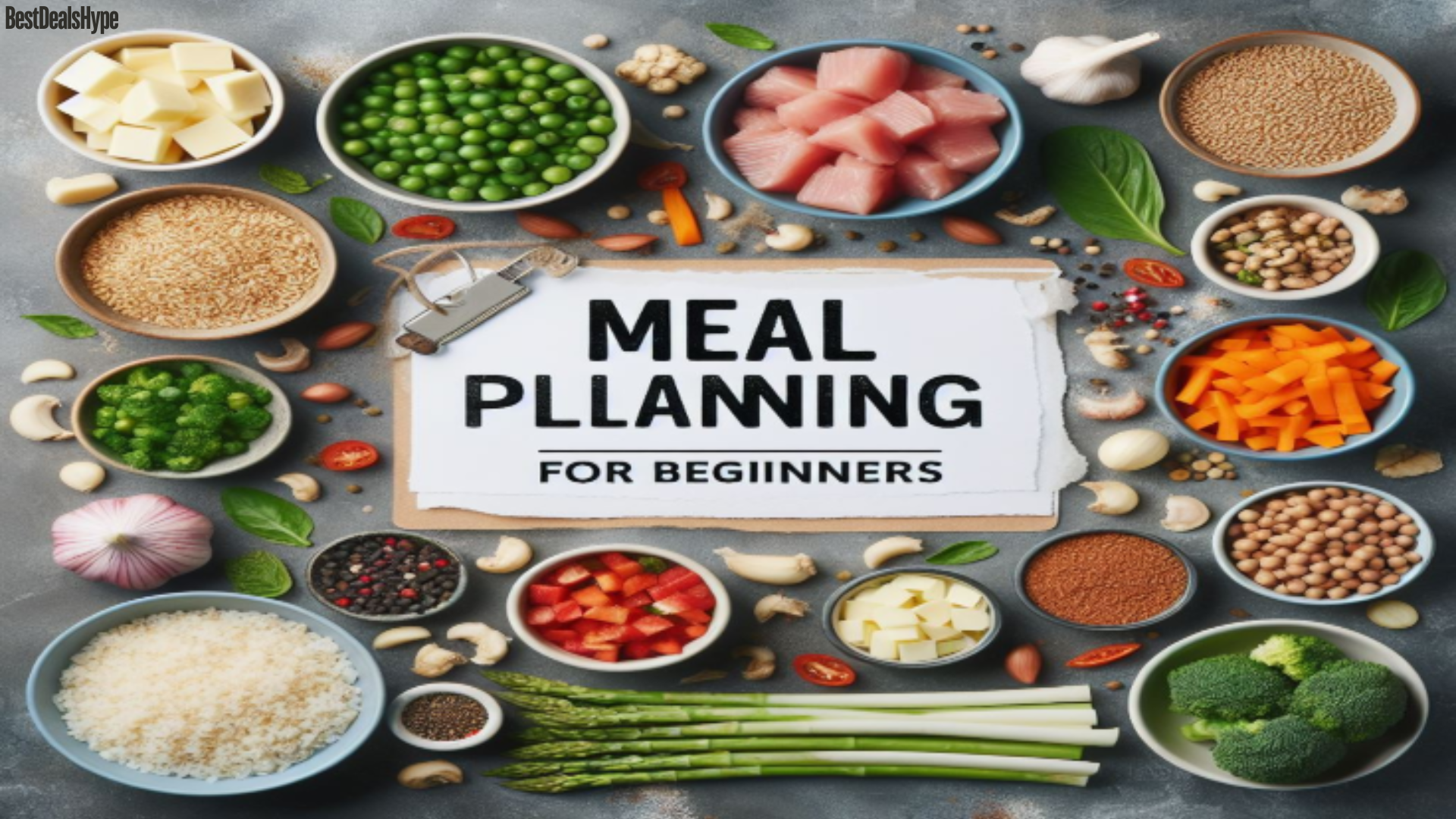Diets
Plant-Based Protein Sources: Adding Variety to Your Diet Without Using Meat
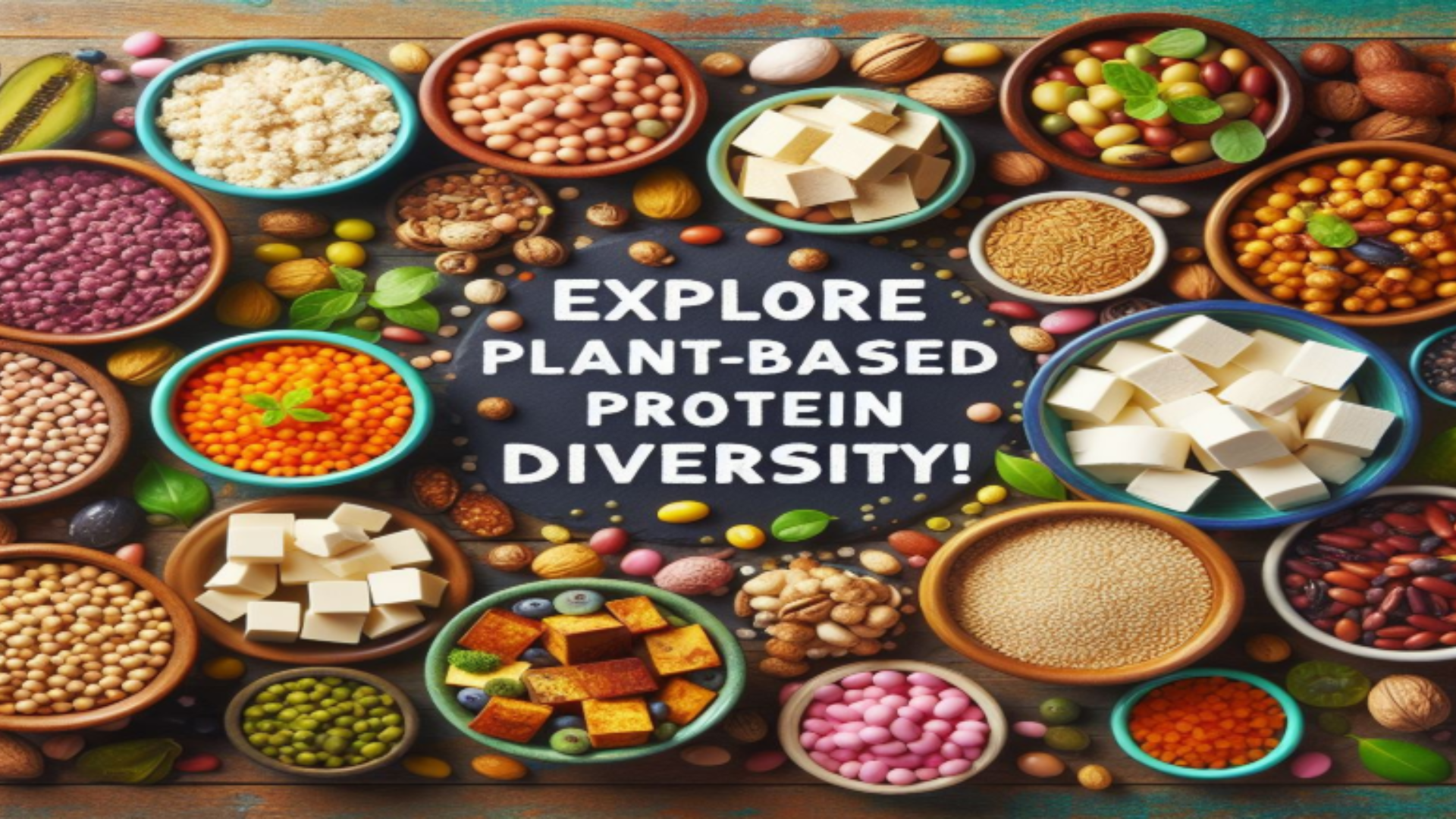
Plant-Based Protein Sources: Adding Variety to Your Diet Without Using Meat
As people are changing their diets due to many reasons including health, environment, and ethic, the protein sources are on high. Although many of the main nutrients that people got from meat in the past, people are paying increased attention to the improved take plant protein. By practical definition, there is the ordered by the popularity list of vegan recipes: The following are the main reasons: Attracting clients from the other hence establishing a better market position. Consequently, anyone who is keen to cut down on his meat intake – or even eliminate it altogether – can surely draw sustenance from the plant world, a veritable treasure trove of good nutrition.
The Rise of Plant-Based Protein:Plant-based protein:
There are several reasons why plant-based protein sources have particularly come into focus in the last couple of years:
- Health Benefits: Plant sourced proteins are most often than not; rich in fats and cholesterol when compared to their animal counterparts but are healthier for the heart. Some of the nutrients that have been noteworthy and have been identified as healthier components include fiber, vitamins, minerals and phytonutrients.
- Environmental Sustainability: Generally, plant proteins are more environmentally friendly than animal proteins regarding the resources they require and the greenhouse gas emissions resulting from their production.
- Ethical Considerations: When people decided to take plant proteins, they are moral that has led them to practice rigorously on how animals are treated in preparation of animal proteins.
Diverse Plant-Based Protein Sources:
Rich and different kinds of proteins are available in plant kingdom in different forms including pulses, cereals, nuts, seeds and certain vegetables also.
- Legumes: The consumption of beans, lentils, chickpeas and peas from the legume family is beneficial to the body as they contain protein, fiber and complex carbohydrates. They can also be added to soups stews salads dips and any sort of dish you would like to prepare at home.
- Tofu and Tempeh: Soybean products such as tofu and tempeh are other sources of proteins with no significant flavor and can be incorporated into several recipes. It can be fried, deep fried, roasted, baked or used in recipes that are customarily prepared with proteins.
- Quinoa: It is also important because quinoa is a total protein containing all nine DAMA acids important when on a vegan diet. It can be used to prepare salads, stir-fried dishes, pilaf, and breakfast bowls with grains and seeds.
- Nuts and Seeds: Nuts such as almonds, walnuts, peanuts, chia seeds, hemp seeds and flaxseeds are a good source of protein, essential fats, vitamins and minerals. Alone, they can be taken as snacks or toppings for fruits, mixed with other foods such as for smoothies, oatmeal or used for garnishing salads and yogurt.
- Seitan: Seitan as a food material is very rich in proteins and is obtained from wheat protein which is also known as wheat gluten. It is soft and there are various methods in preparing and spicing them; the methods included grilling, frying and baking.
- Plant-Based Protein Powders: These protein powders include pea protein and brown rice protein, hemp protein, and soy protein powders which can be incorporated in smoothies, shakes, baked products among others.
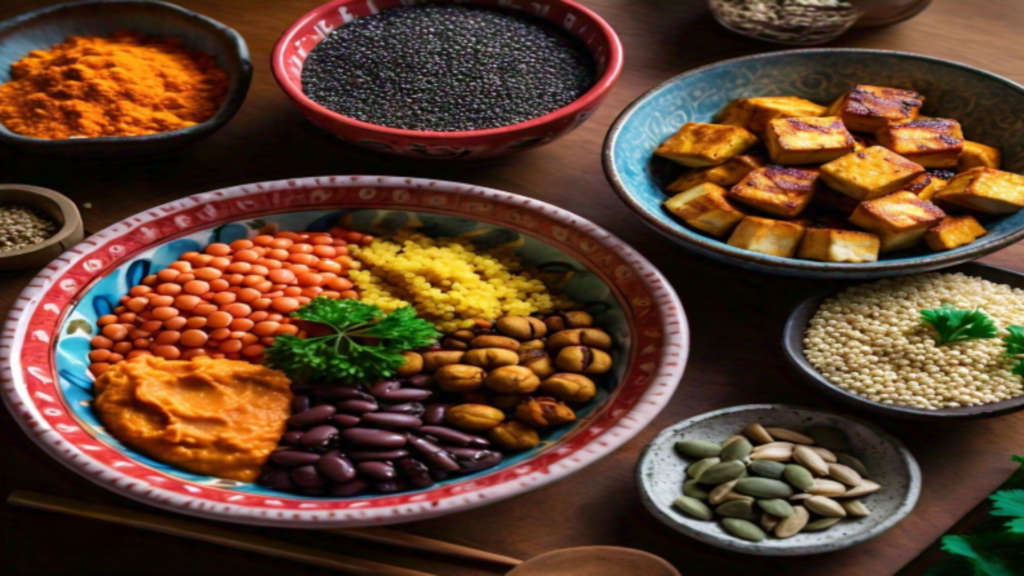
Tips for Incorporating Plant-Based Protein into Your Diet:
Experiment with Recipes: It is suggested to turn to the plant-based recipes of different cuisines in order to expand the versatility of the offered dishes and gain the experience of new tastes and perception. Meals should not be boring and unappetizing: try to make use of different ingredients in varied ways and prepare dishes using different techniques.
Balance Your Plate: Try to incorporate the different sources of plant proteins in your diet while making sure you eat a lot of vegetables and fruits, healthier carbohydrate sources, and healthy fats.
Read Labels: When choosing packaged plant-based products some important factors to look at are the list of ingredients as well as the nutrition facts label to see if the product fits into your dietary requirements and preferences.
Plan Ahead: Here is an overview of a balanced plant-based protein diet: As much as possible, apply portion control or pre-portioned meals and snacks so you can monitor what you eat at a given time in relation to the previous/next meals or snacks. Don this preparation in advance to allow for easy preparation during the actual cooking process.
Embracing Plant-Based Protein:
It can easily be said that with more or less involve into plant based diet that just being a vegetarian can be a lot of fun and flexible to boot and add more variations to your meals, not only flavorful but nutritious as well and without relying on meat. It hence becomes possible for one to get to enjoy yummy and wholesome meals by trying different types of plant based proteins that are available in the market, not only are they good for the body but are also friendly to the environment and minimize the suffering of animals.
Finally, one may conclude that plant-based proteins are non only tasty and good for our health, but also are sustainable and ethical. Blending a raw food diet with the right combination of plant-protein sources is a good way of having multiple preferences of the food in terms of flavor and texture, besides the health effects of the raw food diet.
Therefore, it might be a great idea for everyone to find out more about plant-based proteins by trying other alternatives to tasty foods. It’s time to enjoy amazing flavors, feel good with your choices and the actual state of the Earth.
FAQs about Plant-Based Protein Sources
1. The nutritional quality of plant proteins; are they as complete as animal proteins?
- Plant proteins are often incomplete in that they do not contain all the essential amino acids, but you don’t need to consume them all at once; they should be spread out over the course of the day.
2. Is it possible to get all the protein requirements through vegetable products only?
- It is, however, quite possible to get all your protein from plant products only. Some of the vegetable sources of protein include beans and peas; tofu and tempeh; quinoa; nuts and seeds; and protein powder supplement from plant sources.
3. Is it possible to rely on plant-based proteins for satisfying athletes’ and active people’s nutritional needs?
- Absolutely! Protein ingested in plants offer the essential amino acids required in muscle repair and growth. There are many populations of athletes and physically active people who are capable of meeting all their performance requirements without consuming animal products.
4. Since I want to gain as much muscle mass as possible while following a vegan diet, what should I do?
- There is a suggestion to increase the number of servings of protein-containing plant-based food as a group in the menu and snacks. It is advised that one should plan for his or her meals in advance in order to be in a position to measure the quantities Large portions should not be cooked and one should Ensure that there is provision of protein foods for the day requirement.
Diets
Understanding Your Body’s Authentic Cues of Hunger and Fullness through Intuitive Eating

The principles guiding the intuitive eating process are based on unconditional permission to eat and ten principles that include eating when hungry. In contrast with most diet regimens where individuals are limited in what they can eat and when they can eat it, intuitive eating is about paying attention to one’s body and respecting it. This holistic article will further discuss more about intuitive eating, its advantages, and helpful suggestions towards the attainment of IE.
Understanding Intuitive Eating
Intuitive eating is an approach to eating that recognizes and relies on the internal cues something within you, as you, as a person, understands that you have within you the ability to make the right choices with respect to food. Unlike popular dieting trends that seek to eliminate hunger or dictate when and what to eat through other people’s rules and regulation, intuitive eating is about listening to your body and supporting it as it shares signals that you can understand and honor.
Key Principles of Intuitive Eating:Key Principles of Intuitive Eating:
- Reject the Diet Mentality: Health over weight loss – say no to our long held mindset of dieting and categorizing foods into good and bad foods.
- Honor Your Hunger: When you feel hungry follow that sensation and do not force yourself to eat either to avoid eating or just out of routine.
- Make Peace with Food: Some of the principles are: Permit yourself to eat and try all foods without feeling some level of guilt or remorse.
- Challenge the Food Police: Question the mental scripts that defend the status quo of eating behaviour and its associated quantities.
- Respect Your Fullness: The first one is listening to your body’s fullness signals and breaking from the eating table when the donut is satisfied.
- Discover the Satisfaction Factor: Opt for foods that give you joy, which can be understood not only as the food you like to eat but as the food that is good for you.
- Cope with Emotions without Using Food: If one is always stressed, bored or sad, instead of going for a quick fix from a pantry, they can seek other forms of comfort.
- Respect Your Body: Love your body size, shape, and all of its capabilities without being influenced by outside forces.
- Exercise for Pleasure: Develop physical activity that you like and that provides you with a sense of well-being, without focusing on calories or weight.
- Honor Your Health with Gentle Nutrition: Eat foods in ways that do not compromise your health and your palate and foods that will make you happy.
Benefits of Intuitive Eating
Some of the advantages of incorporating the application of IE include; Intuitive eating can improve your health in several ways; Both your physical and psychological well-being will benefit from eating in this method.
Physical Benefits:
- Improved Relationship with Food: In other words, if you’re able to start listening to your body and understand the cues it gives you, you’ll learn to prevent developing such disorders when it comes to interactions with foods.
- Better Digestion: Particularly if one is not restricted with the time of eating, acknowledging the feeling of hunger and feeling of fullness has health benefits for the digestive system.
- Balanced Energy Levels: Getting hungry signals that you have to eat bare, corrects your glucose level and avert low energy episodes.
Mental and Emotional Benefits:
- Reduced Stress and Anxiety: Eliminating eating or dieting rules can help overcome the problem associated with stress and anxiety of eating habits and body shape.
- Enhanced Body Satisfaction: Stated in other words, unconditional acceptance of one’s body along with the corresponding respect results in a positive shift in how one perceives their body and, consequently, in the improvement of self-acceptance.
How to Practice Intuitive Eating
Intuitive eating therefore is a process of learning that a person has to take to ensure that he or she is fully aware of the things that happen around him or her.
Tips for Practicing Intuitive Eating:Tips for Practicing Intuitive Eating:
- Start by Listening to Your Body: We must learn to go through the day being more sensitive to the hunger and fullness signals that are produced by our body.
- Eat Mindfully: Take time to chew well and appreciate the flavor, finesse of your food before swallowing it.
- Give Yourself Permission to Eat: Both free your mind and your body from food guilt and free your mind and your body up for all foods.
- Practice Self-Compassion: It is essential to be compassionate towards oneself and accept that intuitive eating is a new skill that progresses in a zigzag manner.
- Seek Support: Seek out friends, family, or maybe even some health care professionals that you trust and who will support an intuitive eating approach.
- Stay Flexible: It is essential to eat liberally and to allow yourself to eat foods of a variety without having to worry about the consequences that may come with the food choices that are being made.
- Practice Self-Care: To help the body, mind, and spirit to stay healthy, nourish them by giving time to sleep and rest, fun activities, and relaxation.
Exploring the Nuances of Intuitive Eating
As you will discover, there are significant differences between the theories and practices of Intuitive Eating and the actual practice of the concepts.
Tuning Into Hunger and Fullness Cues:
- Physical vs. Emotional Hunger: It is crucial to recognize the difference between hunger resulting from the body’s need for nutrition and the hunger that stems from psychological factors when trying to practice intuitive eating. While physical hunger can manifest through sensations in the body, for example hunger pangs or tiredness, emotional hunger on the other hand is an emotional response usually brought about by stress, boredom or sadness.
- Variability of Hunger and Fullness: It is worth understanding that hunger and fullness signals are not constant and stable day by day and even meal by meal due to fluctuation in the activities, stress, and hormonal changes. Listening and responding to these signals is a daily process of continuously monitoring and modifying your eating habits.
Honoring Food Preferences and Cravings:
- All Foods Fit: Intuitive eating is a significant concept because it allows one to give themselves permission to eat all foods. Intuitive eating means respecting your preferences and desires that is why regardless of whether you are eating salad, you should eat it with the same pleasure as when eating desert.
- Sensory Satisfaction: Focusing on the licking of foods and also the feeling of foods in the mouth play an important role in promoting the eaters satisfaction with foods.
Cultivating Body Trust and Acceptance:
- Body Neutrality: While body positivity is a concept of acceptance and appreciation of all body types, body neutrality aims at giving the body the respect it deserves without considering the form. Choosing not to be so fixated on the body and processes leading to it might be useful on your road to diverse body acceptance.
- Mindful Movement: Intuitive eating is not only applicable to the aspect of the food we take but also encompasses the movement and exercise we take. One of the objectives of intuitive movement is to do physical activities that give you the feelings of fun and enjoyment rather than for the purpose of dissipating calories or remodifying the body.
Conclusion
Intuitive eating is one of the most compassionate and real-life approaches to feeding your body and attending to the relationship between food. This approach advocates that one needs to pay attention to his or her body’s signals, and respect them to get empowered and feel well when it comes to eating foods. This is important to remember: intuitive eating is not about achieving the ideal, but it is a journey towards positive change and finding oneself on the way to better wellness.
FAQs about Intuitive Eating
1. Is intuitive eating a form of dieting?
- I must say that intuitive eating is not a diet. It is an eating style which encourages mindful intake of foods based on the natural hunger and satiety signals rather than the rules governing dieting.
2. Is it possible for anyone to engage in intuitive eating?
- Yes, intuitive eating is possible for everyone regardless of age, gender, ethnicity, or any other factors. This can be helpful for those who have previously had issues with conventional diets or eating disorders.
3. Does Intuitive eating help in weight loss?
- Intuitive eating is not necessarily a diet designed for weight loss, but rather a healthful eating model that ought to be embraced. That said, weight fluctuations might be expected for some individuals as a result of embracing IE.
4. When can one expect to begin noticing changes with intuitive eating?
- The process of achieving positive results while practicing intuitive eating lasts different amounts of time for different individuals. Though some may derive the benefits within a short period, others may notice the effects after a longer period. It is all about being patient, kind to oneself, and steadfast.
5. Can Intuitive eating help in cases of emotional eating?
- Indeed, intuitive eating can be beneficial in this aspect as it enables the individuals to address their emotions without resorting to eating. As part of intuitive eating, people are encouraged to identify and manage their emotional eating causes.
Blog
What Is the Best Protein Source for Your Body?
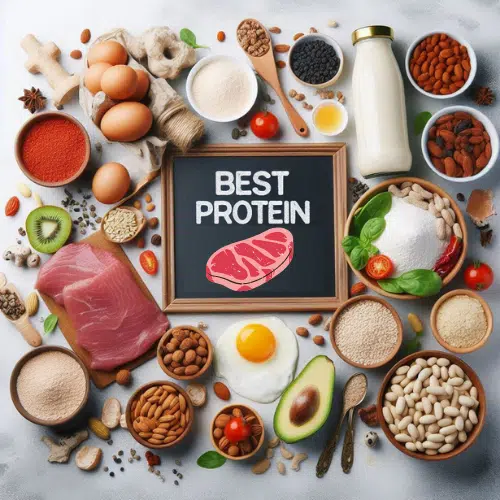
Poking at the nutritional value, protein is one significant nutrient that is used in the body in the building of tissues, repair and various other functions. Protein belongs to a type of macromolecule which is composed of amino acids which are common known as the vital macromolecule. It is important for muscle building, immune system, and several functions within the body.I But while there are many sources that you can get protein from, how do you tell which one will be healthier for your body? This is going to be a complete guide on Protein sources/ Types wherein we will talk about all forms of protein and then identify what type of protein will suit you the best.
Protein and its relevance in the body: A look into definition of Protein
Like carbohydrates and fats, protein is a macronutrient, meaning that it is important to the body for proper functioning. Unlike fats and carbohydrates, there is no protein storing process in our body, which means we need to include it in our diets.
Key Roles of Protein:
- Muscle Repair and Growth: Protein will play a vital role in muscle repair and building and it is therefore important to have it after exercise.
- Enzyme and Hormone Production: They all are made of chains of amino acids; many enzymes and hormones in our body are made of proteins.
- Immune Function: Proteins are vital structures of the body and are vital in the formation and function of the immune system.
- Transport and Storage of Molecules: Protein is involved in the movement of molecules and nutrients within a cell and they act as storage places.
Types of Protein Sources
Sources of Protein are again both animal based as well as plant based. In turn, all the mentioned sources have their advantages and useful properties, as well as disadvantages and vices.
Animal-Based Proteins
Now, animal based proteins are normally referred to as complete proteins because they contain all the essential amino acids that are required by our body. Some common animal-based protein sources include:Some common animal-based protein sources include:
1. Meat:
- Beef, Pork, and Lamb: They are protein foods and also contain other nutrients compounds such as iron and zinc. However, they are also higher in saturated fats and this makes them unfavorable for use in preparing foods for consumption.
- Chicken and Turkey: Said meats are very rich in protein and have less fat than the red meats though containing a higher cholesterol level.
2. Fish and Seafood:
- Salmon, Tuna, and Mackerel: These are fatty fish, which are also sources of proteins and should also carry omega-3 fatty acids which are good to the heart.
- Shellfish: Other seafoods, such as shrimp, crab and lobster are also other hardy protein sources with relatively low fats.
3. Dairy Products:
- Milk, Cheese, and Yogurt: Meals like yoghurt, butter, cheese are really important as they contain proteins and calcium which is vital for building bone types.
- Greek Yogurt: Protein smooth yoghurt: This type of yoghurt contains more protein than the standard yoghurt and is recommended for consumption by individuals who want to get their proteins through snacks.
3. Eggs:
- Whole Eggs: Eggs are considered to be one of the heathiest foods with all the nutritious value including proteins, vitamins, and minerals. The white part of the egg is rich in protein while the yellow part, known as the yolk, is rich in protein, vitamins and fats.
4. Plant-Based Proteins
Protein from plants can be seen to be more popular and common in diet than before most especially for vegetarians and vegans. Although multiple plant protein sources are incomplete, cooking them together and included with other foods will result in all the essential amino acids. Some common plant-based protein sources include:Some common plant-based protein sources include:
Legumes:
- Beans, Lentils, and Chickpeas: These are good sources of protein and these are good sources of fibers. They also contain very small proportions of fat and can assist in complementing correct cholesterol levels in the body.
Nuts and Seeds:
- Almonds, Walnuts, and Chia Seeds: These are good sources of protein and healthy fats. They have to be prepared healthily in order to provide this benefit. It can be used as an ingredient of food products and it can also be incorporated into meals and snacks to boost their protein content.
Whole Grains:
- Quinoa, Brown Rice, and Oats: Through research it is evidenced that whole grains foods contain moderate protein content besides fiber and other nutrients. It is proven that quinoa is a complete protein, which can make it literally priceless for people who decided to go plant-based.
Soy Products:
- Tofu, Tempeh, and Edamame: Soy products are some of the rare products that are plant derived and which are also complete proteins. They can be utilized in different preparations and served in a between-plates manner.
Vegetables:
- Broccoli, Spinach, and Brussels Sprouts: Even though vegetables are not exceptionally rich in protein as compared to meats or dairy products, they do have a certain amount of the nutritional macromolecule and are loaded with numerous other substances.
Comparing Protein Sources
In selecting the best protein, one should first analyze different aspects in relation to protein quality, digestibility and the total nutrient value of the food product.
Protein Quality
Nutritional quality of protein depends on its ability to supply essential amino acids or how easily it is utilized in the body. Animal proteins are superior to plant proteins in most cases because the animal-based proteins contain a complete amino acids chain. However, there are certain plant protein sources such as quinoa and others which may also contain all the essential amino acids.
Digestibility
The rate that protein gets digested and absorbed in the body is also of significance. Word animal proteins are known to be of higher biological value than plant proteins since the former has better digestibility. Still, there are some of the plant proteins that for one reason or another are insoluble, or their digestion is very poor, although if combined, they may become rather well digested.
Nutritional Content
In essence, it is not just the quantity but also the quality of the protein that counts. The nutrient density of a protein source should be put under consideration. For instance, common items such as salmon are rich in protein and omega3 fatty acids that are beneficial to the heart. While beans and lentils provide protein, fiber and vitamins they provide, other benefits include.
Protein meal types: The best proteins to choose for the respective purposes
Protein foods that hold the highest rating are determined by several factors including muscle gain, weight management and overall health goals .
For Muscle Building
Most of the structural and enzymatic proteins need high-quality, complete proteins to enable muscle growth and repairing. Protein sources from animals are preferred due to their composition of all essential amino acids and high biological values they possess; the best example is chicken, fish, and diary products.
- Chicken Breast: Lean meat that offers about 31% high protein concentration with fifty-grams protein per one hundred grams.
- Salmon: Apart from being high in protein they are also sources of Omega-3 fatty acids which are important in rebuilding muscle tissue and supporting the heart.
- Greek Yogurt: Contains approximately 10 grams of protein per serving per 100 grams and could serve as a very suitable snack after training.
For Weight Loss
Protein has benefits for weight loss plan since it increases satiety and maintains muscle mass while on low calorie intake plan. The lean proteins with less fat should be consumed to enable reduction of weights in the body.
- Turkey Breast: An illustration of a lean meat with protein content of roughly 290 g per 100 g.
- Lentils: They are rich in protein and fiber; which makes you feel full for longer, and promotes bowel movement.
- Tofu: A widely-used, lean protein that can be incorporated into different meal preparations.
For Overall Health
From the food point of view, one should consume all types of proteins in order to be as fit and healthy as possible.
- Eggs: An advantageous food, containing protein and other essential nutrients in the diet.
- Quinoa: A protein complex that also holds fiber as well as other nutrients like magnesium and iron.
- Almonds: A good source of protein and healthy fats, which could contribute to the healthy functioning of the heart.
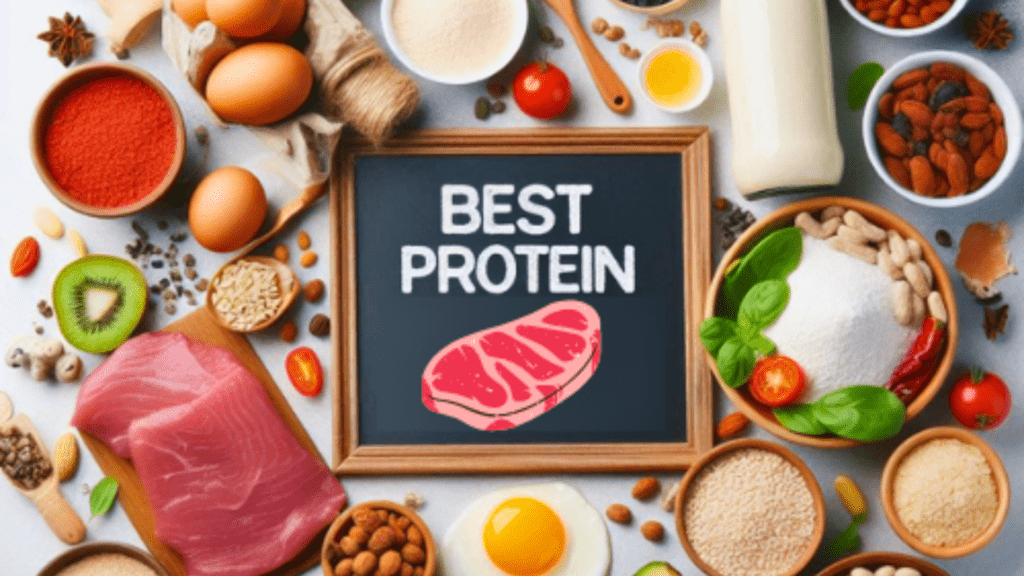
Balancing Animal and Plant Proteins
Though animal protein sources are usually superior in terms of nutritional quality to plant protein sources, they are not without their advantages; they usually provide fiber and phytonutrients. It means that making a combination of both in equal proportions can make it possible to have a balanced diet.
Tips for Balancing Proteins:
- Combine Different Plant Proteins: Pat yourself on the back if you fancy beans with your rice or seeds in your oatmeal as this is good enough for a complete protein package.
- Incorporate More Fish: Try to incorporate some form of fish into your diet at least two times a week to get enough protein and omega-3.
- Snack on Nuts and Seeds: These are easy to come by and can help you increase your intake of protein during the day and in between meals.
FAQs about Protein Sources
What is the importance of protein in the human body?
- Since protein is one of the macronutrients, it plays a significant role in growth, tissue repair, and body tissue maintenance. Muscle building, enzymatic synthesis and hormone synthesis, immune response, nutrient transport and storage are some of the functions of this vitamin.
What do you understand regarding complete and incomplete proteins?
- These are proteins that contain all the nine amino acids which are not synthesized in the body. The animal based complete proteins include meats, fish, eggs, and dairy products while plant-based complete proteins include quinoa and soy. These are proteins that are missing one or more amino acids and they are found in most plant based foods.
Can one consume enough protein from plant sources?
- Yes, it is possible to have your protein requirement met from plant products alone. When you combine two or more plant based protein sources such as beans and rice or hummus and whole grain bread, then you are adequately supplying your body with every amino acid that it needs.
Which foods are rich in animal based proteins?
- Some of the recommended animal-based protein foods include; Chicken breast, salmon, Greek yogurt, eggs, and lean beef and pork. These sources are sources of proteins and other nutrients that are needed in the body system.
Which foods contain the highest amount of protein?
- The best sources of plant proteins include lentils and beans, tofu, quinoa, nuts and seeds and whole grain products. They add protein, fiber, and the appropriate vitamins and minerals to the human body.
Conclusion
The decision-making process of the best protein sources varies with the health and nutritional needs of an individual. It is possible to conclude that animal proteins and plant proteins have their advantages and can be included in our diet. Make sure to try as many different proteins as possible so that the body gets all the essential amino acids that it requires.
This way you are informed and aware of the various protein sources available out there to provide for your nutritional needs. Be it the need to gain muscle mass, shed a few pounds, or just live a healthier life, there is a protein out there for you.
Diets
Budget-Friendly Nutrition: How to Eat Healthy on a Small Income While Still Choosing Nutrient-Rich Foods
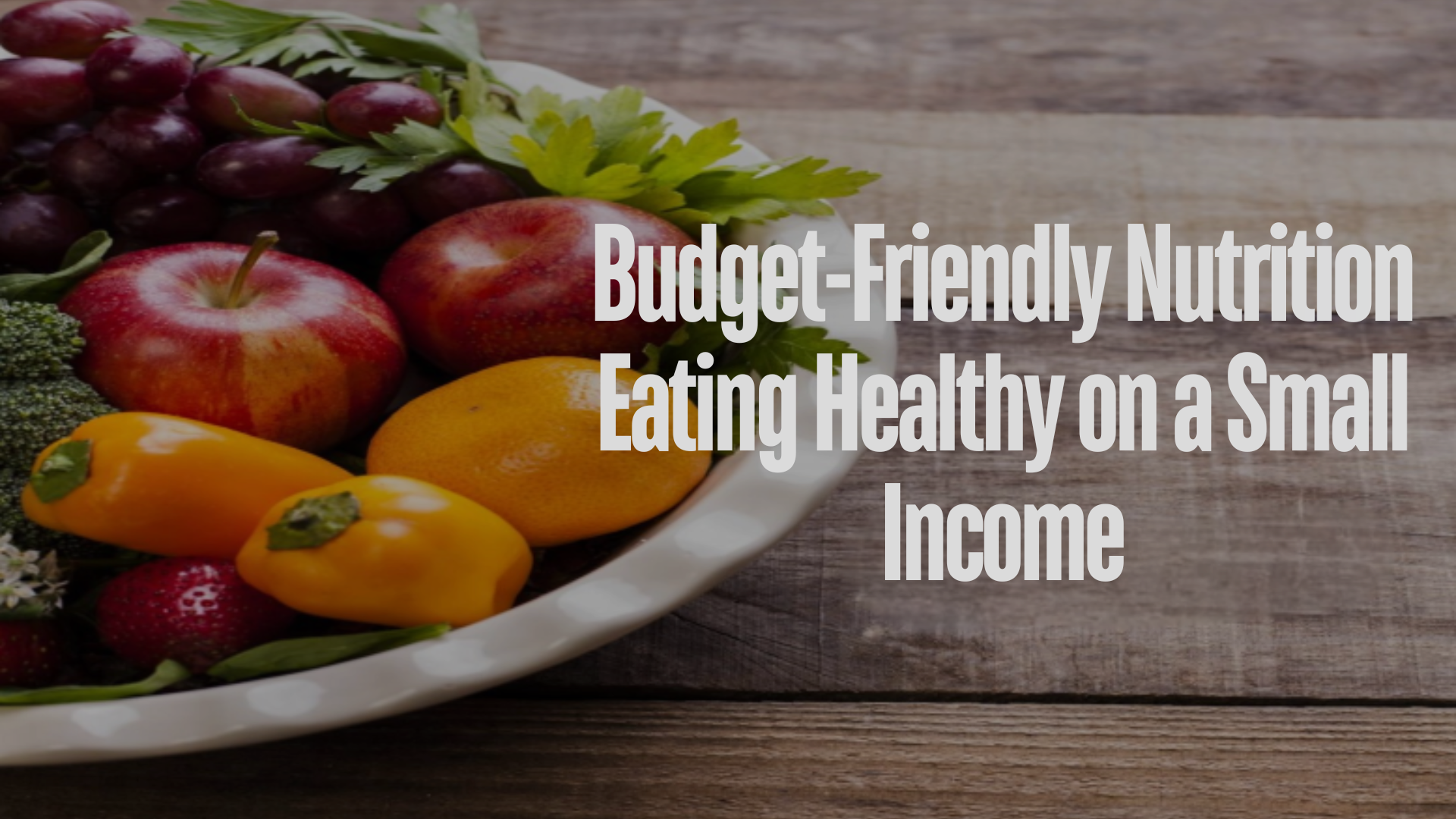
Consuming healthy foods is not always expensive. One can be able to enjoy healthy foods that supply the nutrients needed in the body without having to go broke while doing it. Here we will learn how to make a healthy diet on a low budget so that you can still take care of yourself and your health without overpaying.
1. Organise Your Food Intake and Prepare a Shopping List
So, before going to the supermarket, try to consider your diet plan for the next several days. Emphasis on easy to prepare dishes that can be prepared from readily available inexpensive commodities such as beans, lentils, whole grain products, and fruits and vegetables when in season. After you have your meal plan, it is recommended to make a list and adhere to it to prevent buying unnecessary products.
2. Shop Smart and Take Advantage of Sales and Discounts
Some of the strategies that can help you to save money on your groceries are sales, discounts and coupons. Think about purchasing private or off-brand foods since they can cost less than the well-known brands but are equally healthy. Purchasing in large quantities non perishable foods such as rice, pasta, and beans is also a way of reducing the food expenses.
3. Purchase Fresh and Canned Vegetables
In comparison to fresh fruits and vegetables, frozen and canned fruits and vegetables are cheaper and can be stored for longer periods. Stock up cooked and frozen vegetables like peas, broccoli, and spinach, which can be used in soups, stir-fries, and casseroles. Canned beans, tomatoes and corn are also good staple foods that should be in your pantry since they can help in adding nutrition and taste to your foods.
4. Stock Up and Batch Cook
Preparing foods in large quantities and portion cooking is both efficient and cost effective. Cook in bulk large quantities of soups, stews and casseroles, and then divide into serving portions to freeze. This also helps in avoiding wastage of food and it also provides with fresh home prepared meals in case one does not have time or energy to cook.
5. Focus on Nutrient-Dense Foods
When preparing to buy food while on a tight budget, focus on foods that have the most nutritional value. Such foods include eggs, yoghurt, oats, legumes, and green leafy vegetables, which are rich in protein, fibre, vitamins, and minerals. Consuming these foods can help make up your nutrient requirements without having to break the bank.
6. Minimise Food Waste
Getting the most out of your food expenses means that you need to learn how to minimise food waste. Try to stick to food items that should already be in your pantry and fridge to avoid buying the wrong things. In this case, the leftovers can be used by adding them to other foods or can be used in another meal. Preserve the freshness of the foods that are likely to go bad soon so that they do not spoil quickly.
Conclusion
It should therefore be understood that it is actually very easy to practise proper nutrition even with the limited amount of money that is available for food purchase. Therefore, in the areas of; eating healthy on a small income, preparing meals, purchasing right, buying foods that cost a dollar, and not wasting food. Of course, eating well does not necessarily mean you must spend a lot of money and while following the aforementioned tips, you can be healthy, fit and wealthy.
FAQs
Is it possible to use a small amount of money to buy healthy foods?
- Yes, with proper nutritional planning and good strategies for grocery shopping, it is possible to have healthful and balanced meals at low costs.
How can I cut on my grocery bill while at the same time consume some healthy foods?
- Still, one can wisely spend money on groceries by meal planning, bulk purchases, preferring store brands, and buying food products on sale.
Is it true that consumption of fruits and vegetables which are either frozen or in a can is just the same as taking fresh fruits and vegetables?
- Yes, the use of frozen and canned fruits and vegetables is not less healthy than fresh foods and may even be cheaper. The only precaution you need to take is with regards to additional sugars and sodium that come along with canned foods.
Is cooking in bulk an advantageous method of consuming healthy meals or not?
- Absolutely! Meal preparation in large quantities reduces time and cost since you prepare a number of meals at once which can be useful when you are busy.
What can I do to avoid wasting foods when looking at how to maintain a healthy eating profile and working on a limited budget?
- To help reduce the amount of food waste you make, try to cook using the remaining ingredients and find different ways to reuse leftovers then make sure you store your foods properly.
-

 Blog3 years ago
Blog3 years agoBest Makeup Trends In 2024: Look Beautiful this year
-

 Fitness4 years ago
Fitness4 years agohow to Improve Your Photographic Memory? an ultimate guide
-

 Appliances1 year ago
Appliances1 year agoIntroduction to Network Cards: Evolution, Types, and Technologies
-

 Appliances1 year ago
Appliances1 year agoIntel vs. Apple Silicon: CPU Showdown for Laptops
-

 Appliances3 years ago
Appliances3 years agoBlack Friday Home Appliance Deals: Our Exclusive Sneak Peek On The Early Black Friday Appliances Deals
-

 Technology1 year ago
Technology1 year agoHarnessing Solar Power On-the-Go: The Rise of Foldable Solar Panel Installations
-

 Blog2 years ago
Blog2 years agoTop 5 Best Housewarming Gifts to Warm Someone’s New Home
-

 Blog1 year ago
Blog1 year agoBiotech Breakthroughs: Innovations in Gene Editing, CRISPR Technology, and Personalized Medicine


